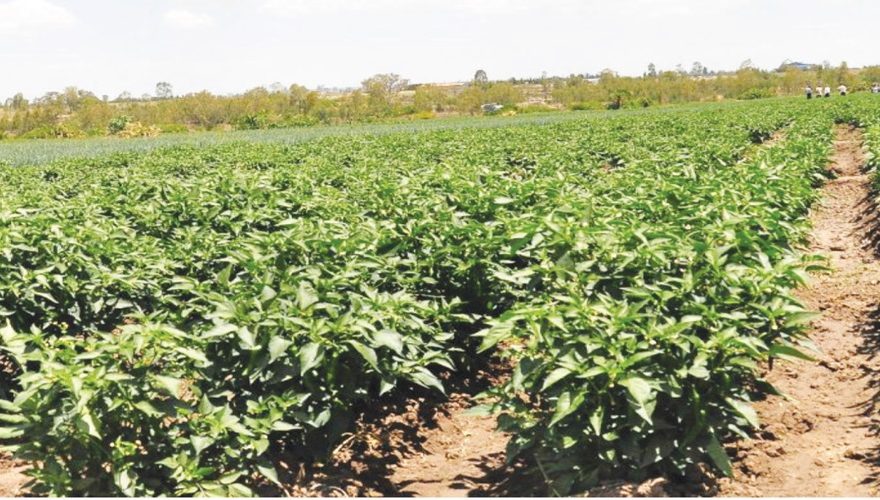
Daniel Shifeta, a resident of Cheha woreda in the Gurage Zone, is a graduate of the Department of Horticulture at Samara University.
Despite his educational background, finding employment in his field proved to be so challenging that he had to lead a period of unemployment for quite few years.
Undeterred by this setback, Daniel took the initiative to collaborate with four of his friends approximately eight years ago. With a loan of 28 thousand birr obtained from the district, they established the Yamni Vegetable and Fruit Growers Association, an irrigation farm on a one-hectare plot of land.
Their efforts have yielded remarkable results as the association at present cultivates approximately 30 hectares of land, yielding crops such as tomatoes, cabbage, lettuce, carrots, and water melon.
Beyond covering their subsistence, they are able to supply the market. Today, the association generates more than 10 million birr, Daniel told the Ethiopian Press Agency. Summer irrigation plays a crucial role in the agricultural practices of the Gurage Zone in Ethiopia. Located in the Central Ethiopian regions, the Gurage Zone has diverse agricultural activities, with a significant focus on crop cultivation.
The region’s reliance on irrigation during the summer months is driven by the need to ensure water availability for crop growth and maximize agricultural productivity. Moreover, the Gurage Zone benefits from its geographical features, as it encompasses several rivers and streams. These water resources serve as a reliable supply for irrigation purposes during the summer. Farmers tap into these bodies of water, utilizing pumps and storage structures to divert water into their fields.
The proximity to water sources enables farmers to establish irrigation networks and efficiently manage water distribution among different plots and crops.
However, it is important to note that the availability and accessibility of water resources can vary, and adequate infrastructure must be in place to ensure equitable water distribution. Summer irrigation ensures a continuous water supply for the crops, reducing the risk of yield loss due to drought stress and water scarcity.
By providing the necessary moisture, irrigation enables farmers to grow a variety of crops, including cereals, pulses, oilseeds, vegetables, and fruits, thus contributing to food security and income generation in the region.
The association has provided employment to around 100 full-time employees and an additional 100 temporary workers. Moreover, they engage in animal husbandry, processing, and presenting the community’s agricultural output while also cultivating plants that serve various purposes, including food production, Daniel noted.
Recognizing the challenges faced by young individuals in terms of accessing stores, financial services, and resources, Ahmed Mohammad, the head of the Cheha woreda agriculture department office, emphasizes the importance of establishing experience exchange programs.
According to him, summer irrigation is currently being practiced on a total of 340 hectares of land within the woreda.
This indicates the extent of agricultural land that benefits from irrigation during the dry season. The implementation of summer irrigation on this scale underscores the importance of water management.
These programs enable young people to gain valuable practical experience in summer irrigation work.
Additionally, efforts are underway to foster connections with local merchants to establish strong market links for the producer community, given the perishable nature and limited shelf life of vegetables, he said.
Aklilu Kasa, head of agricultural crops and deputy head of the Gurage zone agriculture department office, stated in his part the zone’s commitment to irrigation projects not only in Cheha but also in other woredas.
He stated that the agricultural specialists of the region closely collaborate with farmers to optimize land utilization, reduce living costs, and ensure food security for the entire community. In recent years, there have been concerted efforts to improve summer irrigation practices in the Gurage Zone through various initiatives and programs.
The Central Ethiopia region started 30-40-30 initiatives. Thirty different varieties of fruit should be planted in the first year, forty different varieties of fruit seedlings in the second year, and thirty different species in the third year of planting. As a result, a farmer will have a total of three years’ worth of fruit varieties, totaling one hundred.
These initiatives aim to enhance the income of the farmers and ensure food security in the communities. This initiative helps to enhance Water management practices, promote sustainable irrigation techniques, and provide training and capacity building to farmers.
For instance, educational programs have been conducted to raise awareness about efficient irrigation methods, water conservation, and the importance of crop water requirements. Additionally, the introduction of modern irrigation technologies, such as solar-powered pumps and water-efficient irrigation systems, has been encouraged to optimize water use and reduce energy costs.
The impact of summer irrigation in the Gurage extends beyond crop production. It has positive implications for income generation, poverty alleviation, and rural development. By enabling farmers to cultivate high-value crops during the dry season, irrigation opens up opportunities for market engagement and diversification.
It enhances the region’s economic prospects, especially through the production of cash crops like vegetables and fruits, which fetch better prices in the market. Increased agricultural productivity also reduces dependency on food aid and contributes to the overall economic well-being of farming communities.
Daniel remarked on the persistent challenge of inadequate access to loans, stores, and essential resources for youths engaged in various youth associations. This limitation hampers the potential for growth and development among young individuals. Addressing this issue is crucial to empower and support the youth in their endeavors, enabling them to contribute effectively to their organizations and communities.
It addresses the challenges across the sector, minimizing yield losses and ensuring food security. Through the adoption of small-scale irrigation schemes, efficient water management practices, and the utilization of local water resources, farmers in the Gurage Zone can enhance agricultural productivity, income generation, and rural development.
Moreover, sustainable irrigation practices contribute to environmental conservation and long-term agricultural resilience. Continued support, investment, and capacity building in summer irrigation can further empower farmers and foster sustainable agricultural development in the Gurage Zone and similar regions.
Furthermore, summer irrigation has environmental benefits in the Gurage Zone. Efficient water management practices minimize water waste, reducing the strain on local water resources. By optimizing irrigation techniques, farmers can conserve water, mitigate soil erosion, and prevent land degradation.
Additionally, irrigation facilitates crop rotation and intensification, as farmers can cultivate multiple crops within a year, enhancing soil fertility and reducing the incidence of pests and diseases.
These sustainable agricultural practices contribute to the preservation of the region’s natural resources and the long-term resilience of the farming systems. Akililu stated that to fulfill the equipment initiative, partnerships with local authorities are being pursued to provide farmers with access to high-quality seeds, tractors, and hatchery machines.
Furthermore, collaborations with Omo Bank are being explored to facilitate financial support for the farmers. He said the zone is committed to the dedication of local communities and regional authorities to underscore the significance of sustainable agricultural practices in strengthening food security.
Through the empowerment of youth and the establishment of collaborative networks, this initiative paves the way for a prosperous and self-sufficient future, ensuring a steady supply of nutritious food for the region and beyond, he added.
BY FIKADU BELAY
The Ethiopian Herald March 27/2024





